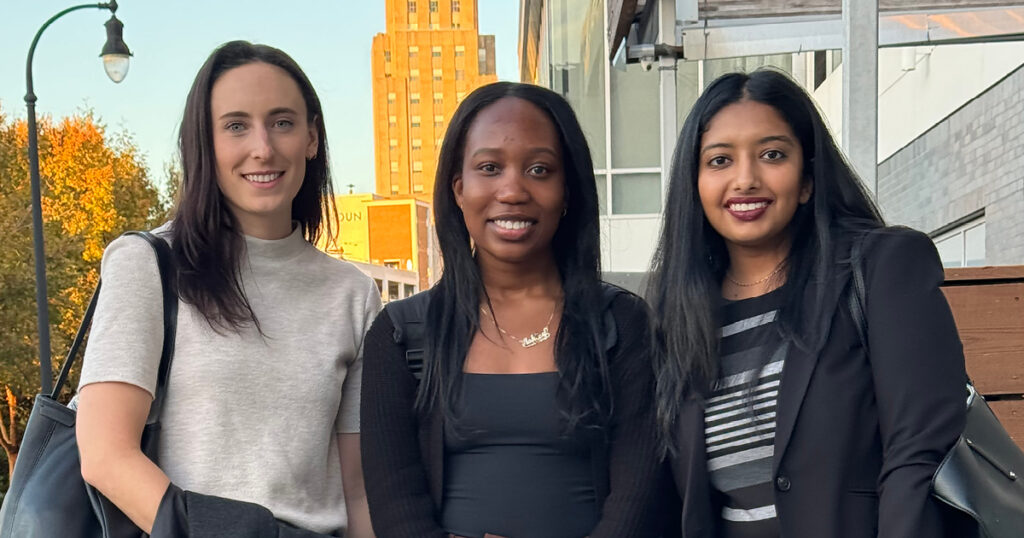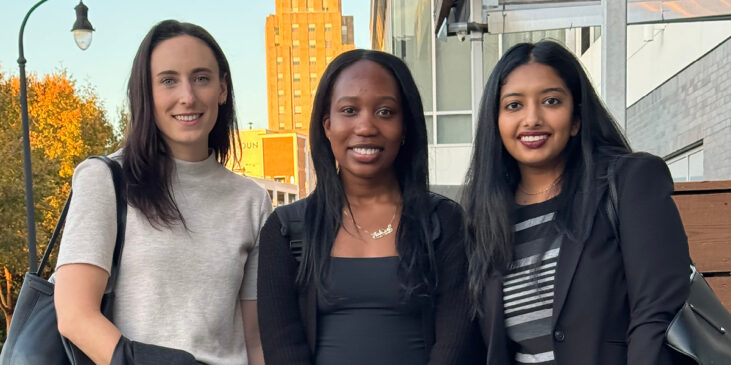
By Rebecca Bliss ’25, Ashley Finney-Wortman ’25, and Brianna Kuriakose ’24
As part of our work as student advocates in New York Law School’s (NYLS) Civil Rights and Disability Justice Clinic, we represent community groups challenging the construction and operation of a fracked gas pipeline, known to residents as the “North Brooklyn Pipeline,” through Brooklyn neighborhoods that are disproportionately made up of people of color. In August 2021, students in the clinic, along with our co-counsel at the National Center for Law and Economic Justice, filed a federal administrative complaint against the New York State Department of Environmental Conservation and the New York State Department of Public Service under Title VI of the Civil Rights Act of 1964 alleging that the construction and operation of the pipeline, which was built without the community’s knowledge or environmental review, was racially discriminatory and violates various New York state and local environmental laws. The U.S. Environmental Protection Agency (EPA) and the U.S. Department of Transportation (DOT) accepted the complaint for investigation.
Our work in the clinic this year builds on the work of our clients and previous clinic students as the EPA and DOT continue their investigation of our complaint. As part of our ongoing environmental justice work, it’s important that we study the history and key legal cases of the movement in the United States, which is why, in our seminar, we read about the people of Warren County, North Carolina’s opposition to and ultimately successful campaign for the cleanup of a toxic landfill in what came to be known as the birthplace of the environmental justice movement. So, it was especially exciting for us when we had the opportunity to travel with the clinic’s director, Professor Britney Wilson, to Durham, North Carolina for the Summit on Climate, Environmental Justice, Racism, and the Law in November 2023.
Attending the summit was a great and informative experience. The summit gathered community advocates and lawyers from nonprofit organizations across the country who are battling environmental justice issues in their own areas. The purpose was to share our experiences and provide tips, resources, and any advice.
We attended panel discussions about different aspects of environmental justice. Brianna attended an inspiring panel on the role of the law and the courts that stressed the importance of not losing hope even when decisions may not go the way we want. Rebecca learned about other issues in the environmental justice space and additional areas where impact litigation can make a difference. Ashley delved deeper into current issues relating to energy distribution at a panel about how that can affect minority communities and the environment.
Thoughts on the Summit Experience
Rebecca Bliss ’25
The Summit allowed us to take our casework into the advocacy space and discuss and hear from other advocates working on similar cases or with more experience navigating impact litigation. The experience of discussing our cases with other advocacy groups and issue-centered advocates allowed us to step outside of the day-to-day tasks of casework and classwork and see the more significant role that the law plays in grassroots advocacy. It was interesting to hear advocacy groups speak about their successes and failures in their grassroots mobilization. It helped to inform my perspective on our clients and their next steps. The summit also provided a test to our understanding of our casework. Throughout the weekend, individuals would ask us about our cases and the laws at issue, and it allowed me to test my understanding in explaining it to others outside of the legal team.
Ashley Finney-Wortman ’25
I thought it was interesting as a law student to listen in a space where most of the audience had specialties in activism or environmental causes and try to understand some of the solutions they were seeking. It was interesting to compare our case with other environmental issues some of the people at the summit are going through and even to speak and have people ask me questions. I also appreciated being able to have open conversations about race and the environment in a safe space. I went into this summit with a broad knowledge of what environmental justice law was, and I came out of it with a better understanding of it and how some activists and lawyers will try to fight it.
Brianna Kuriakose ’24
Meeting different people who are passionate about their own projects from all over the country invigorated me in my work for the pipeline case. The people we met reminded me of the community advocates we have been working with who are incredibly passionate about their communities and the harm that is befalling them. I think the summit was a great collaborative space. It felt like the people there had a sigh of relief because it no longer felt like they were alone in these battles. My main takeaway from the conference is that there is strength in numbers. We see a lot of groups dealing with similar issues regarding marginalized communities bearing the brunt of environmental atrocities, and I think that if we mobilize together and combine our efforts it will draw more attention across the board. I think this real-world experience was a great way for us to understand that this kind of work is not easy and that it takes time, patience, and resilience.
Overall, the three of us thoroughly enjoyed the summit in North Carolina. We met great people, learned a lot, and even bonded with our classmates over fried green tomatoes and hushpuppies. We plan to use what we’ve learned as we continue our work in the clinic.
Experiential Learning at New York Law School’s Plumeri Center
Experiential learning is an integral part of the NYLS education. The Plumeri Center is NYLS’s home for experiential learning, and the Center houses our many clinics, including the Asylum Clinic. Through our top-tier programs, we offer students the opportunity to turn theory into practice: Starting in their first year, students participate in counseling, interviewing, and negotiating exercises in their foundational Legal Practice course. During their upper-level years, students may select from a wide array of experiential learning courses to hone their lawyering skills. Together with a comprehensive legal education, these experiential offerings prepare our students for careers in advocacy.

